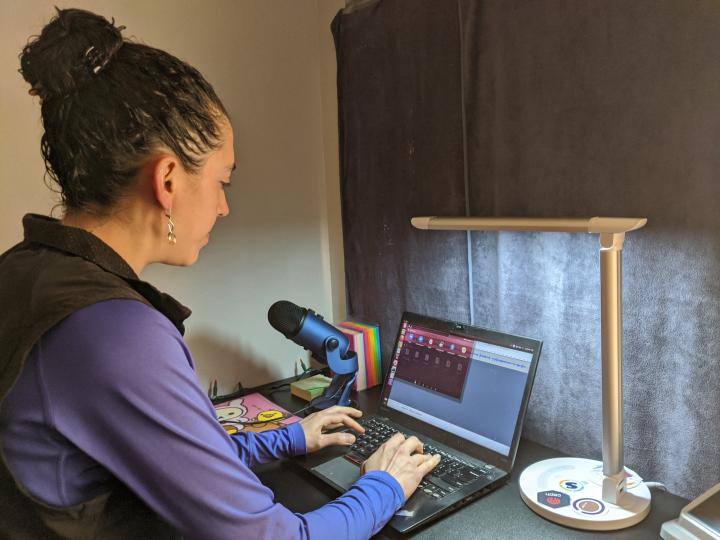With an intro tune of a singing dinosaur, Research Software Engineer Stories is a new interview-style podcast designed to spotlight the diverse and interesting people within the research software engineer (RSE) community at Stanford and beyond.
Created and hosted by University IT’s Vanessa Sochat, this series of short and fun episodes celebrates the uniqueness of the RSE role by highlighting IT colleagues and their stories.
Why representation matters
While she works as a full-time software engineer, this part-time project is one of great importance for Vanessa. She believes there is a need to increase awareness about research software engineers to obtain better support at an institutional level.
“When you graduate from Stanford, you should be able to consider these kinds of roles alongside a software engineer (SWE) position in the industry. This means a competitive salary, benefits, and prospects for career growth. This isn't currently the case, so a lot of talent goes away from academic research. The quality of the research, and of the research software, suffers,” she said.
The podcast also brings a voice to so many that have devoted their entire careers to working on research software. Some RSEs might publish on their own or via a lab, but the majority do a lot of the hard work without much of the glory. Vanessa’s podcast places RSEs in the spotlight and helps grow awareness of the role.
How did this podcast get started?
It all began when Vanessa started as a Stanford grad student in 2011. She quickly realized how difficult it was to get things done because the research software that she needed to use for her work in neuroimaging informatics didn’t really do what she needed it to.
Fast forward a few years to 2016, and although research software engineers have existed at Stanford for many years, Vanessa is one of Stanford’s first formally titled Research Software Engineers.
The United States (US) Research Software Engineer Association was only recently established, however, there have been people acting as RSEs in labs for much longer. In Vanessa’s case, she had a vision for research software engineering at Stanford when she was still in graduate school. She was passionate about building better tools, developing container technology, and when she graduated in 2016 she worked with her current supervisor and head of Research Computing, Ruth Marinshaw, to carve out a role for an RSE.
When asked what led to the development of the podcast, Vanessa responded, “I've had my head down for a few years developing software, and now that containers and high-performance computing (HPC) are a well-established thing, the timing is just right now to work on the community aspect.”
Vanessa woke up early one morning in September 2019 and it hit her. She had been chatting with Ian Cosden from Princeton about a written story to include on the US-RSE community blog and he mentioned he hadn’t found the time to finish it. She realized that it would be quicker to have a recorded conversation.
The national community of RSEs had also been struggling to define the role of an RSE, and efforts to do so through publication or limited perspectives of a few individuals seemed off. Vanessa knew this was something that she needed to do. She recorded her first conversation via Zoom, used open-source software to edit the audio, created a website with a feed for iTunes, uploaded the file to it, and officially launched her RSE podcast. She now has six episodes available on the website and more in development.
Episodes
Each episode of the podcast is about 20 minutes in length and features a different person from across the nation with a unique story to tell. Vanessa schedules her interviews in advance to accommodate audio editing, which can take quite a while to get just right.
For introverted interviewees who don’t necessarily want their voice to be featured, Vanessa writes down a few questions and asks the person she’s interviewing to provide her with written answers. True to the name of the podcast, she then writes a story to highlight the experience of the RSE and shares the answers on the podcast website. Episode 5, “The Lab Without a Couch,” is an example of this particular format.
Key learnings
After spinning up a podcast series with virtually no recording or editing experience, Vanessa has learned that it's important to have an open mind, to include folks with lots of different backgrounds, and to not take herself too seriously.
She also doesn’t put too much pressure on herself for the podcast itself. A challenge moving forward will be to make sure that it's sustainable, which she believes shouldn’t be an issue as long as interest from US-RSE and the community continues and grows.
If you’re interested in participating as a guest on the podcast, or know of someone who works with research software and has an interesting story to tell, whether locally or nationally, please contact Vanessa Sochat at vsochat@stanford.edu.


